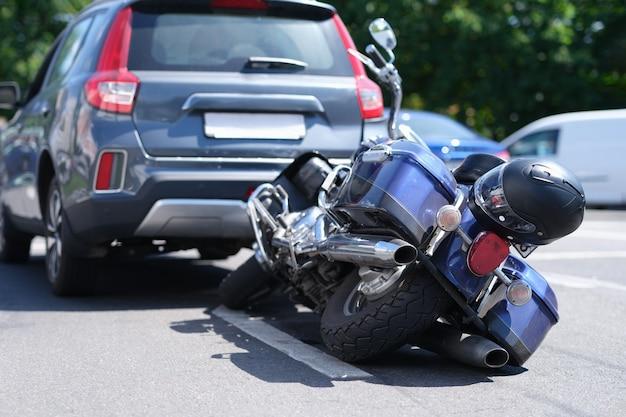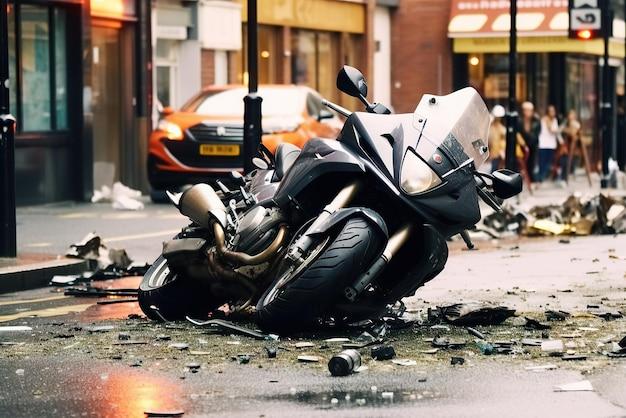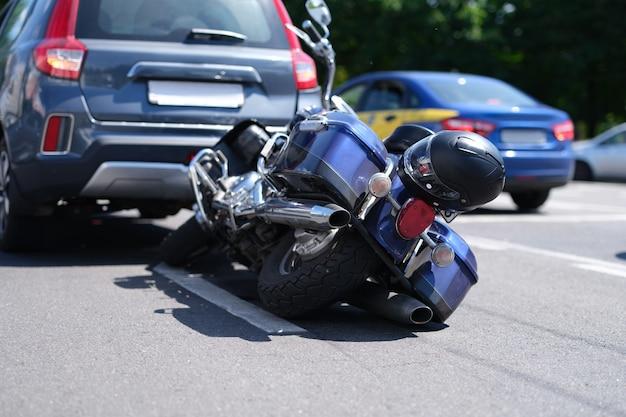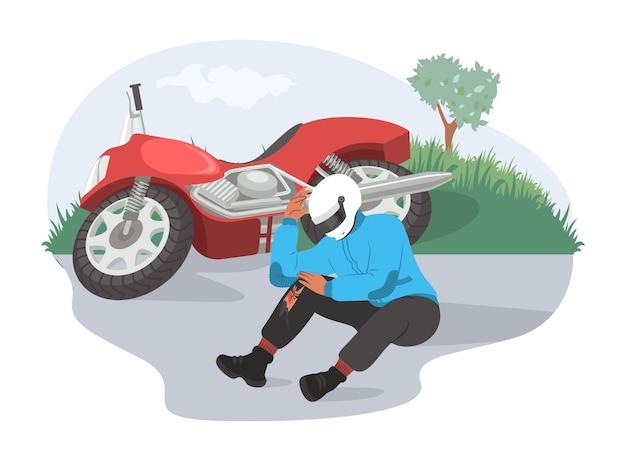Riding a motorcycle can be an exhilarating experience. The wind in your face, the open road, and the feeling of freedom are all part of the allure. Unfortunately, motorcycle accidents are all too common, and they can be devastating. It’s essential to know how to survive a motorcycle accident and what to expect afterward.
According to the National Highway Traffic Safety Administration, motorcycle riders are 27 times more likely to die in a crash than car occupants. That’s a staggering statistic, and it’s no wonder that so many people wonder about the chances of surviving a motorcycle accident.
Can someone survive a motorcycle accident? The short answer is yes, but it depends on several factors, such as the speed of the crash, the type of impact, and whether the rider was wearing protective gear like a helmet and leather clothing.
Of course, the best way to increase your chances of survival is to prevent an accident in the first place. Always wear protective gear, stay alert, and follow the rules of the road. But if you do find yourself in an accident, it’s important to know what to expect and how to deal with the aftermath.
In this post, we’ll explore what you can do to survive a motorcycle accident, what to expect afterward, and how to get back on the road to recovery. We’ll delve into the life expectancy of motorcycle riders, the chances of dying in a motorcycle accident vs car, and even the odds of surviving a motorcycle crash at 70 mph. So, let’s dive in and learn what you need to know about surviving a motorcycle accident.
Surviving a Motorcycle Accident: What You Need to Know
If you’re a motorcycle enthusiast, you know the risks involved in using this mode of transportation. Even if you’re an excellent rider, accidents can happen to anyone. Being involved in a motorcycle accident can be a terrifying and life-changing experience, but surviving it is even more challenging. Here are a few essential things you should know to help you survive a motorcycle accident:
The Importance of Wearing Protective Gear
Wearing protective gear is one of the most crucial things you can do to increase your chances of surviving a motorcycle accident. Even if you’re just taking a short ride, always wear a helmet, gloves, pants, long-sleeved shirt, and boots. These materials provide protection from road rash, bruises, and head injuries. Make sure your gear fits correctly and doesn’t have any damage before hitting the road.
How to Respond in the Immediate Aftermath
Immediately following an accident, you may feel dazed and in shock, making it challenging to think clearly and remain calm. However, being mindful of what you should do could save your life. First should be checking for injuries. If you can move, check on others involved. If someone is injured, dial emergency services as soon as possible then attend to the injured person.
Getting Legal Help
After surviving a motorcycle accident, it’s essential to note that you might have a claim for personal injury. Seek legal representation if another party played a role in the accident or if you sustained injuries. A personal injury lawyer may have the experience and knowledge necessary to help you navigate the legal process and negotiate with insurance adjusters.
Recovering from Emotional Trauma
Surviving a motorcycle accident can be a traumatic experience. It’s essential to take care of your mental health in addition to your physical recovery. Seek emotional support from friends, family, or a professional therapist to help you deal with any resulting emotional trauma.
In summary, surviving a motorcycle accident requires taking steps to prevent injuries, act quickly in the immediate aftermath, consider legal assistance, and address resulting emotional trauma. Remember that while motorcycle accidents can be terrifying, it’s possible to come out on the other side and live a fulfilling life.
Surviving a Fatal Car Accident
Car accidents can be fatal, and the thought of surviving a fatal car accident seems almost impossible. However, it is possible to survive a fatal car accident with the right measures:
Always wear your seatbelt
Wearing a seatbelt is the single most critical measure you can take to increase your chances of surviving a fatal car accident. Be sure to wear your seatbelt every time you’re in a car, even if you’re the driver.
Have a plan of escape
If you find yourself in a car accident, knowing what to do can help you get out of the situation quickly. Always have a plan of escape in case of an emergency.
Stay calm
It might seem like the worst thing to do in a car accident, but staying calm can help you think more clearly and get out of the situation as quickly as possible. If you’re in a situation where you need to make quick decisions, try to stay as calm as possible.
Call for help
If you find yourself in a car accident, calling for help as soon as possible can help increase your chances of survival. Be sure to call for emergency services immediately.
Always drive sober
Drinking or using drugs and driving is not only illegal but also highly dangerous. Driving under the influence can significantly increase your chances of getting into a fatal car accident. Always wait until you’re sober to drive.
Surviving a fatal car accident might seem impossible, but taking the necessary precautions can significantly increase your chances of survival. Make sure you always wear your seatbelt, have a plan of escape, stay calm, call for help, and avoid driving under the influence. These measures can help ensure that you make it out of a car accident alive.
Life Expectancy of Motorcycle Riders
Riding a motorcycle comes with a significant risk, and riders are more vulnerable to accidents than drivers of other vehicles. In fact, according to recent studies, one of the most harrowing facts about motorcycles is that riders are approximately thirty-five times more likely to die in an accident than drivers of cars. Furthermore, motorcycle accidents often result in serious injuries or even fatalities.
Statistics on Life Expectancy of Motorcycle Riders
Motorcycle riders are also more prone to fatal accidents than other road users. Statistics indicate that the average lifespan of a motorcyclist is shorter than that of a non-rider, and a large percentage of riders who survive motorcycle accidents often end up with life-changing injuries that negatively impact their life expectancy.
Factors that Influence Life Expectancy of Motorcycle Riders
Several factors affect the life expectancy of a motorcycle rider. For instance, speeding, driving under the influence of drugs or alcohol, and failing to wear protective gear such as a helmet are some of the biggest risk factors that can affect a biker’s life expectancy. While it is impossible to predict how long a rider will live, taking steps to prevent crashes and minimize exposure to danger is crucial in reducing the likelihood of an accident.
The important thing to remember is that motorcycle riding, while thrilling and exciting, carries a level of inherent risk that other vehicles do not have. As a rider, taking steps to protect yourself and minimize danger by wearing protective gear, following traffic rules, and engaging in responsible riding habits can help you live a healthier, longer life. Stay safe on the road!
Chances of Dying on a Motorcycle Reddit
If you’re wondering about the chances of dying in a motorcycle accident, you’re not alone. Many bikers and enthusiasts have taken to Reddit to share their thoughts, personal experiences, and statistical analyses of the subject. Let’s take a closer look at some of the views expressed.
Personal Experiences
While some motorcyclists swear by the safety provided by their helmets and protective gear, many have experienced close calls. According to one Reddit user, “I’ve been commuting on a motorcycle for 10 years now and had a couple of close calls. I try to play it safe, but you never know what the other drivers are going to do.”
Another user shared a sobering statistic, “Motorcycle fatalities per mile traveled were approximately 28 times higher than for passenger car occupants in 2016.”
Statistics
Many Reddit users have cited statistics from organizations like the National Highway Traffic Safety Administration (NHTSA). According to the NHTSA, “Motorcyclist deaths occurred 28 times more frequently than fatalities in other vehicles.”
Despite these startling statistics, other users argue that with proper training, equipment and precaution, the risk of dying in a motorcycle accident can be significantly lowered.
So, what are the chances of dying in a motorcycle accident? The answer depends on several factors such as rider experience, road conditions, safety equipment, and the behavior of other drivers. However, one thing is certain, motorcycling does come with some inherent risks.
It’s important to remember that while the risk of dying in a motorcycle accident may be higher than in a passenger car, this doesn’t mean it’s inevitable. By taking necessary precautions and being vigilant on the road, riders can significantly reduce their risks.
Can You Really Survive a Motorcycle Accident
As thrilling as it might be to ride a motorcycle, the risks associated with it cannot be ignored. Being involved in an accident is always a possibility, and the consequences can be devastating. However, the question remains: can you survive a motorcycle accident?
It Depends on Several Factors.
The outcome of a motorcycle accident can vary depending on several factors, including the severity of the crash, the speeds involved, the protective gear worn by the rider, and how quickly emergency medical services can arrive on the scene.
Protective Gear Can Help You Survive.
Wearing the right gear when riding a motorcycle can significantly increase your chances of survival in the event of an accident. A helmet can protect your head from severe head injuries, while sturdy jackets, gloves, boots, and pants can prevent road rash and other injuries.
The Speed of the Crash Matters.
The speed at which a motorcycle is traveling during an accident can have a significant impact on the rider’s chances of survival. Avoiding high-speed collisions or cutting speed during an accident can help reduce the severity of injuries.
Reaction Time Is Crucial.
A rider’s reaction time during an accident is just as crucial as their riding skills. The more quickly a rider can react during an accident, the more likely they are to avoid serious injuries or even survive the crash.
Professionally Trained Riders Are Better Equipped to Survive.
Riders who undergo professional training and obtain their licenses are more equipped to handle accidents than those who do not. Proper training can help riders develop the skills necessary to react quickly and avoid high-speed collisions.
Surviving a motorcycle accident is possible, but it depends on several factors. Riders who wear protective gear and undergo proper training stand a better chance of avoiding severe injuries or surviving a crash. Ultimately, it’s essential to stay alert, cautious, and well-informed before riding a motorcycle.
What to Expect After a Motorcycle Accident
Getting into a motorcycle accident can be a traumatic experience, and the aftermath can leave you feeling confused and overwhelmed. Here’s a breakdown of what you can expect in the days and weeks following a motorcycle accident.
Physical Injuries
Motorcycle accidents often result in physical injuries, even if you were wearing protective gear at the time of the accident. You may have broken bones, cuts, bruises, or muscle or nerve damage. It’s essential to seek medical attention as soon as possible to assess the severity of your injuries and receive appropriate treatment.
Emotional Response
It’s typical to experience a range of emotions after a motorcycle accident. You may feel shock, anger, frustration, fear, or sadness. You may also experience anxiety and stress, especially if you’re in pain or facing mounting medical bills. It’s essential to recognize these emotions and seek support from loved ones, a therapist, or a support group.
Financial Burden
Motorcycle accidents can be costly, especially if you require medical treatment or need time off work to recover. You may also need to repair or replace your motorcycle. Depending on the circumstances of the accident, you may be able to claim compensation from your insurance company or file a lawsuit. It’s crucial to consult with an attorney who specializes in motorcycle accidents to understand your legal options.
Rehabilitation
Depending on the severity of your injuries, you may need to undergo physical therapy or rehabilitation to recover fully. This may involve exercises, mobility aids, or even surgery. It’s essential to follow your doctor’s instructions and attend all follow-up appointments to ensure a smooth recovery.
Returning to Riding
After a motorcycle accident, you may be hesitant to get back on your bike. It’s normal to feel scared or anxious, but it’s essential to take your time and ease back into riding. Consider taking a refresher course or practicing in a safe, controlled environment before hitting the open road again.
In conclusion, surviving a motorcycle accident is a challenging experience, but understanding what to expect in the aftermath can help you prepare for the road to recovery. Don’t hesitate to reach out for support and seek professional advice if necessary.
Can You Survive a Motorcycle Crash at 70 MPH
If you’ve ever ridden a motorcycle, you know that it can be an exhilarating experience. The wind in your hair, the sensation of speed, and the freedom of the open road can make you feel like you’re invincible. But what happens when the unthinkable occurs? What happens when you’re involved in a motorcycle accident at high speeds, like 70 miles per hour? Can you survive? In this section, we’ll take a closer look.
The Reality of High-Speed Motorcycle Accidents
Before we answer the question, it’s important to understand the reality of high-speed motorcycle accidents. When you’re traveling at such speeds, the force of impact is immense. A collision with a stationary object, like a tree or wall, can result in catastrophic injuries that are often fatal. Even collisions with other vehicles can cause serious harm, and the chances of survival decrease as the speed increases.
Surviving a Motorcycle Accident at 70 MPH
So, can you survive a motorcycle accident at 70 miles per hour? The answer is: it depends. While some riders may be able to walk away from such an accident with only minor injuries, the majority of riders will suffer severe injuries or possibly even lose their lives.
Factors that can affect your chances of survival include:
- Wearing appropriate safety gear, such as a helmet and protective clothing
- The type of motorcycle you’re riding
- The type of accident, such as a collision with another vehicle or a stationary object
- The angle of impact and the location of the impact on your body
- Your age, health, and physical fitness
While it’s impossible to predict the outcome of a motorcycle accident at 70 miles per hour, taking steps to protect yourself can improve your chances of survival. Always wear appropriate safety gear, ride defensively, and be prepared for the unexpected. Remember that accidents can happen to anyone, but with the right mindset and precautions, you can reduce your risk and enjoy riding for years to come.
Odds of Dying in a Motorcycle Accident vs Car
It’s a common perception that motorcycles are more dangerous than cars, but is it true? Let’s dig into the statistics and find out the odds of dying in a motorcycle accident vs car.
Understanding the Statistics
The National Highway Traffic Safety Administration (NHTSA) provides statistics on traffic fatalities. According to the NHTSA data, in 2019, there were 36,096 fatalities in motor vehicle crashes in the US, out of which 4,985 were motorcyclists. This means that motorcyclists accounted for about 14% of all traffic deaths, while cars and light trucks accounted for the majority of traffic fatalities.
Fatality Rates
The NHTSA also provides fatality rates per 100 million vehicle miles traveled (VMT) for different types of vehicles. The fatality rate for motorcycles was 25.67, while the fatality rate for passenger cars was 1.11 in 2019. This means that motorcyclists are nearly 26 times more likely to die in a crash than passenger car occupants.
Risk Factors
Motorcycles are more vulnerable to crashes than cars due to their small size and less stability, which makes them more prone to accidents such as collisions with other vehicles, hitting fixed objects, or losing control. Moreover, the lack of safety features, such as airbags or seat belts, increases the risk of serious injuries or fatalities.
While motorcycles may have a higher fatality rate per mile traveled than cars, this shouldn’t deter people from riding motorcycles. With proper training, protective gear, and following traffic laws, motorcyclists can reduce their risk of accidents and injuries. So, if you’re a motorcycle enthusiast, don’t be discouraged by the odds! Instead, ride safely and enjoy the thrill of the road.
Surviving a Motorcycle Accident: What Are Your Chances
Riding a motorcycle can be a thrilling experience, but it also comes with certain risks. One of the biggest concerns for riders is the possibility of getting involved in an accident. While accidents are unfortunately a reality of riding, many riders wonder what their chances are of surviving a motorcycle accident.
Factors Affecting Your Survival Rate
Many factors can affect your chances of surviving a motorcycle accident. These can include:
1. Age
Age is an important factor to consider when it comes to survival rates. According to the National Highway Traffic Safety Administration (NHTSA), older riders tend to have a higher fatality rate than younger riders. This could be due to declining physical abilities or slower reaction times.
2. Helmet use
Wearing a helmet is essential for protecting your head during an accident. According to the Insurance Institute for Highway Safety (IIHS), helmets are about 37% effective in preventing motorcycle fatalities.
3. Speed of the crash
The speed at which your motorcycle is traveling at the time of the crash can significantly impact your chances of survival. The faster you’re going, the more forceful the impact will be, leading to more severe injuries.
4. Type of motorcycle
The type of motorcycle you’re riding can also impact your survival rate. For instance, riders of sport bikes have a higher fatality rate than those riding cruisers. Sport bikes are faster, and the riders tend to take more risks, which can increase their chances of getting into an accident.
Survival Rates for Motorcycle Accidents
According to the NHTSA, the fatality rate for motorcycle riders has been steadily increasing over the past decade. In 2019, 5,014 people died in motorcycle crashes in the United States. However, not all accidents are fatal, and many riders do survive.
The survival rate for motorcycle accidents varies depending on the circumstances. According to some estimates, as many as 80% of motorcycle accidents result in injury, while only 20% result in fatalities. However, the severity of the injuries can vary greatly.
While getting involved in a motorcycle accident can be scary, it’s important to remember that many riders do survive. Factors such as age, helmet use, speed, and type of motorcycle can all impact your chances of survival. By practicing safe riding habits, wearing proper safety gear, and being aware of your surroundings, you can help minimize your risk of being involved in an accident and increase your chances of surviving if you are.
How Long Does It Take to Heal from a Motorcycle Accident
Getting involved in a motorcycle accident is a traumatic experience that can leave you physically and emotionally scarred for a long time. While some injuries may heal within a few weeks or months after the accident, others may require longer periods of recovery. The time it takes to recover from a motorcycle accident depends mainly on the severity of the injuries sustained and the quality of treatment received.
Minor Injuries
If you sustain minor injuries in a motorcycle accident, such as scrapes, bruises, and minor cuts or burns, you can expect to heal within a few days or weeks. However, it’s important to visit a doctor immediately after the accident to rule out any underlying injuries that may not be apparent.
Moderate Injuries
Moderate injuries from motorcycle accidents, such as broken bones, lacerations, and torn ligaments or tendons, can take anywhere between three to six months to heal fully. It’s important to follow your doctor’s recommendations for treatment to promote quick and proper healing.
Severe Injuries
Severe injuries, such as traumatic brain injuries, multiple fractures, and internal injuries, can take several months or even years to heal completely. Treatment for severe injuries may involve surgery, physical therapy, and long-term rehabilitation programs.
Factors That Affect Healing Time
Several factors may influence the healing time after a motorcycle accident. These factors include the age of the victim, overall health, the severity of the injury, and the quality of treatment received. Some lifestyle factors, such as smoking and drinking alcohol, may also delay healing after an accident.
In conclusion, the time it takes to heal from a motorcycle accident depends on the type and severity of the injury sustained. It’s essential to seek immediate medical attention after an accident to ensure that any injuries are properly diagnosed and treated. With the right treatment, a positive attitude, and the support of friends and family, victims of motorcycle accidents can recover fully and resume their normal lives.
Chances of Surviving a Motorcycle Accident without a Helmet
Motorcycle helmets are the most critical piece of safety gear for riders on any motorcycle. Wearing a helmet can mean the difference between life and death in an accident. Helmets provide the head with a much-needed cushion to prevent severe head injuries that could cause death. But what are the chances of surviving a motorcycle accident without a helmet?
The Grim Reality
The reality is that the chances of surviving a motorcycle accident without a helmet are very slim. Studies have shown that wearing a helmet can reduce the risk of head injuries by 69% and death by 42% in the event of an accident. This means that not wearing a helmet increases the risk of sustaining severe head injuries and death.
The Impact
In the event of an accident, the impact of hitting the road or another object can cause the head to absorb a significant amount of force. Without a helmet, the brain is more susceptible to injuries due to the force of impact. These injuries can be severe and life-threatening.
The Importance of Wearing a Helmet
Wearing a helmet is crucial for every rider to protect themselves in case of an accident. A helmet can aid in reducing the risk of severe head injuries, major cranial damage, and even death. There is no better way to ensure survival in the event of a crash than prevention through the use of a helmet.
In conclusion, the chances of surviving a motorcycle accident without a helmet are slim. The use of a helmet is the primary way to protect oneself from severe head injuries and even death in the event of an accident. While it may seem inconvenient or an unnecessary burden, the use of a helmet is crucial for any rider wanting to ensure their safety. It’s better to be cautious and wear a helmet than to regret it later. Stay safe, and always wear a helmet while riding.



